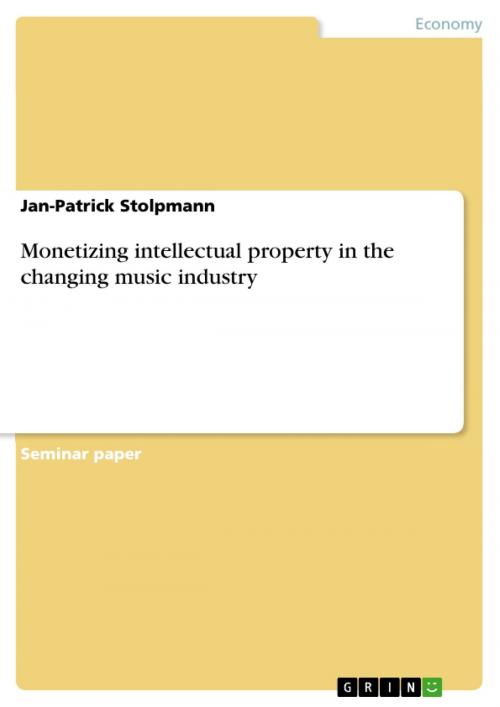Monetizing intellectual property in the changing music industry
Business & Finance, Marketing & Sales| Author: | Jan-Patrick Stolpmann | ISBN: | 9783640919239 |
| Publisher: | GRIN Publishing | Publication: | May 18, 2011 |
| Imprint: | GRIN Publishing | Language: | English |
| Author: | Jan-Patrick Stolpmann |
| ISBN: | 9783640919239 |
| Publisher: | GRIN Publishing |
| Publication: | May 18, 2011 |
| Imprint: | GRIN Publishing |
| Language: | English |
Seminar paper from the year 2010 in the subject Business economics - Marketing, Corporate Communication, CRM, Market Research, Social Media, grade: 2,0, Cologne University of Applied Sciences (Fakultät für Wirtschaftswissenschaften), course: Export Management and International Marketing, language: English, abstract: Imagine a world without music and you will realize it's a fundamental part of our lives. It's something we encounter daily; both in our working lives and leisure time, and is as essential a part of our culture as the written word. As something that is both inherently desirable and necessary for a full life, it's a valuable commodity, and traded as such all over the world. The development of the music as an industry was itself a fundamental process in the way consumers accessed music, brought about by the desire of composers and performers in the 18th century to free themselves of the restrictions on their work that were imposed by the princes and bishops who sponsored them. In realizing that people were willing to pay for the privilege of hearing or playing their music, they sold their works in print and charged for their performances, and thus bought their artistic freedom. At present the industry is going through a period of great change. The introduction of the digital download market has meant re-thinking of business models and finding new sources of revenue, as well as new ways in which to protect interests. It's tempting to see such periods of change as deeply negative but the industry has gone through many such periods, and has continued to flourish and adjust itself over the decades. In this term paper I will discuss the recent changes within the music industry and how this is effecting the monetization of intellectual property. I will focus on the two main groups, labels and artists, while pointing out the effects and opportunities of these changes for each of them. While doing so I´ll try to highlight the relevance of credits in music along with how recent developments in terms of digital download have affected them.
Seminar paper from the year 2010 in the subject Business economics - Marketing, Corporate Communication, CRM, Market Research, Social Media, grade: 2,0, Cologne University of Applied Sciences (Fakultät für Wirtschaftswissenschaften), course: Export Management and International Marketing, language: English, abstract: Imagine a world without music and you will realize it's a fundamental part of our lives. It's something we encounter daily; both in our working lives and leisure time, and is as essential a part of our culture as the written word. As something that is both inherently desirable and necessary for a full life, it's a valuable commodity, and traded as such all over the world. The development of the music as an industry was itself a fundamental process in the way consumers accessed music, brought about by the desire of composers and performers in the 18th century to free themselves of the restrictions on their work that were imposed by the princes and bishops who sponsored them. In realizing that people were willing to pay for the privilege of hearing or playing their music, they sold their works in print and charged for their performances, and thus bought their artistic freedom. At present the industry is going through a period of great change. The introduction of the digital download market has meant re-thinking of business models and finding new sources of revenue, as well as new ways in which to protect interests. It's tempting to see such periods of change as deeply negative but the industry has gone through many such periods, and has continued to flourish and adjust itself over the decades. In this term paper I will discuss the recent changes within the music industry and how this is effecting the monetization of intellectual property. I will focus on the two main groups, labels and artists, while pointing out the effects and opportunities of these changes for each of them. While doing so I´ll try to highlight the relevance of credits in music along with how recent developments in terms of digital download have affected them.















